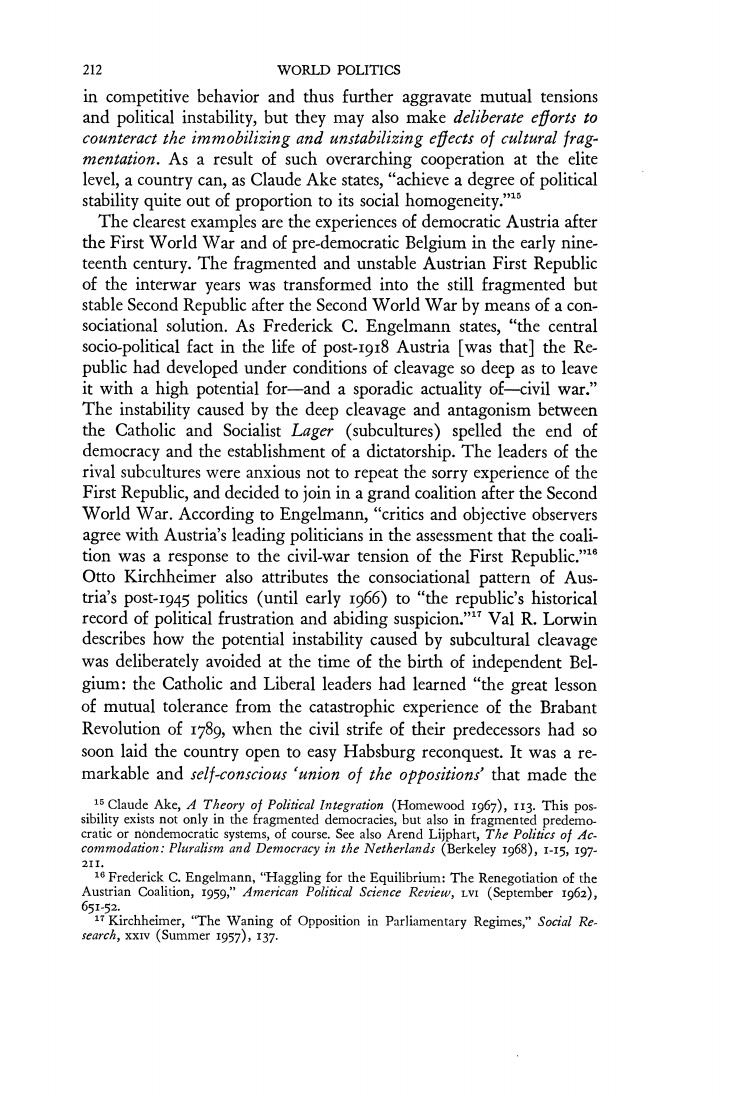正在加载图片...

212 WORLD POLITICS in competitive behavior and thus further aggravate mutual tensions and political instability,but they may also make deliberate efforts to counteract the immobilizing and unstabilizing effects of cultural frag- mentation.As a result of such overarching cooperation at the elite level,a country can,as Claude Ake states,"achieve a degree of political stability quite out of proportion to its social homogeneity. The clearest examples are the experiences of democratic Austria after the First World War and of pre-democratic Belgium in the early nine- teenth century.The fragmented and unstable Austrian First Republic of the interwar years was transformed into the still fragmented but stable Second Republic after the Second World War by means of a con- sociational solution.As Frederick C.Engelmann states,"the central socio-political fact in the life of post-1or8 Austria [was that]the Re- public had developed under conditions of cleavage so deep as to leave it with a high potential for-and a sporadic actuality ofcivil war." The instability caused by the deep cleavage and antagonism between the Catholic and Socialist Lager (subcultures)spelled the end of democracy and the establishment of a dictatorship.The leaders of the rival subcultures were anxious not to repeat the sorry experience of the First Republic,and decided to join in a grand coalition after the Second World War.According to Engelmann,"critics and objective observers agree with Austria's leading politicians in the assessment that the coali- tion was a response to the civil-war tension of the First Republic. Otto Kirchheimer also attributes the consociational pattern of Aus- tria's post-1945 politics (until early 166)to"the republic's historical record of political frustration and abiding suspicion.Val R.Lorwin describes how the potential instability caused by subcultural cleavage was deliberately avoided at the time of the birth of independent Bel- gium:the Catholic and Liberal leaders had learned "the great lesson of mutual tolerance from the catastrophic experience of the Brabant Revolution of 1789,when the civil strife of their predecessors had so soon laid the country open to easy Habsburg reconquest.It was a re- markable and self-conscious 'union of the oppositions'that made the 15 Claude Ake,4 Theory of Political Integration (Homewood 1967),113.This pos. sibility exists not only in the fragmented democracies,but also in fragmented predemo- cratic or nondemocratic systems,of course.See also Arend Lijphart,The Politics of Ac- commodation:Pluralism and Democracy in the Netherlands (Berkeley 1968),1-15,197- 2I1, 16 Frederick C.Engelmann,"Haggling for the Equilibrium:The Renegotiation of the Austrian Coalition,1959,"American Political Science Review,LvI (September 1962), 651-52. 11 Kirchheimer,"The Waning of Opposition in Parliamentary Regimes,"Social Re- search,xxiv (Summer 1957),I37